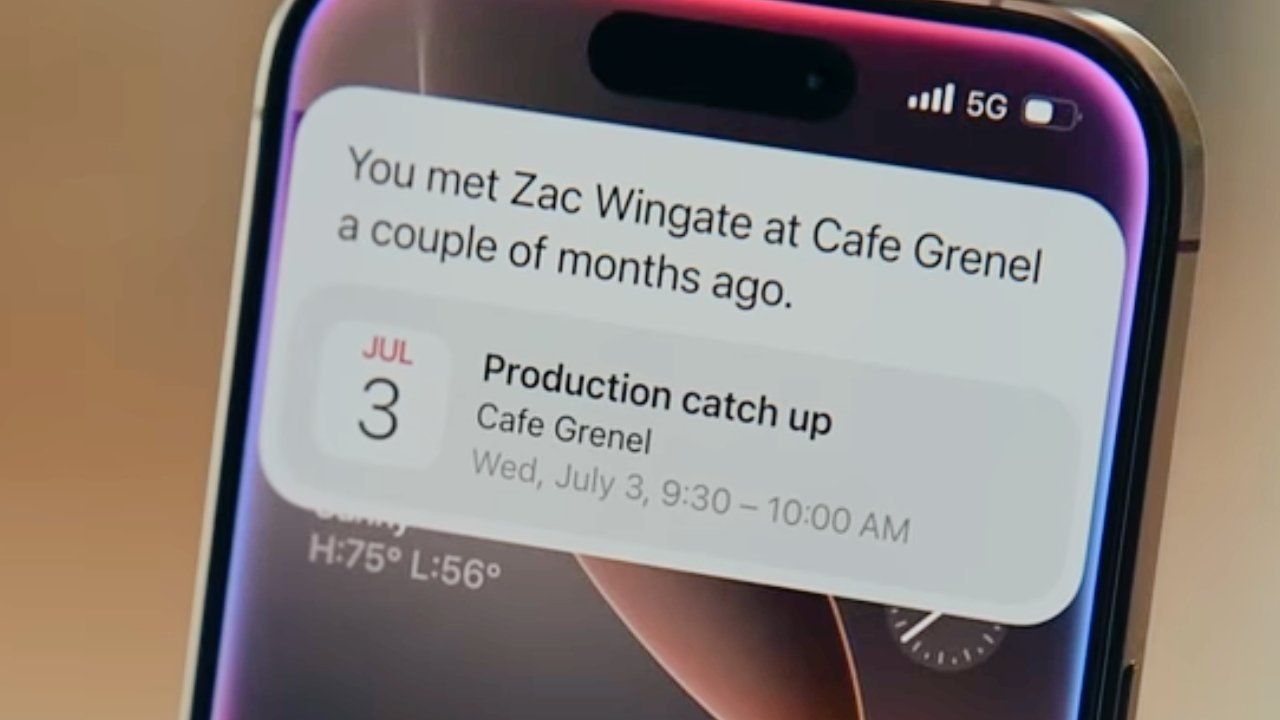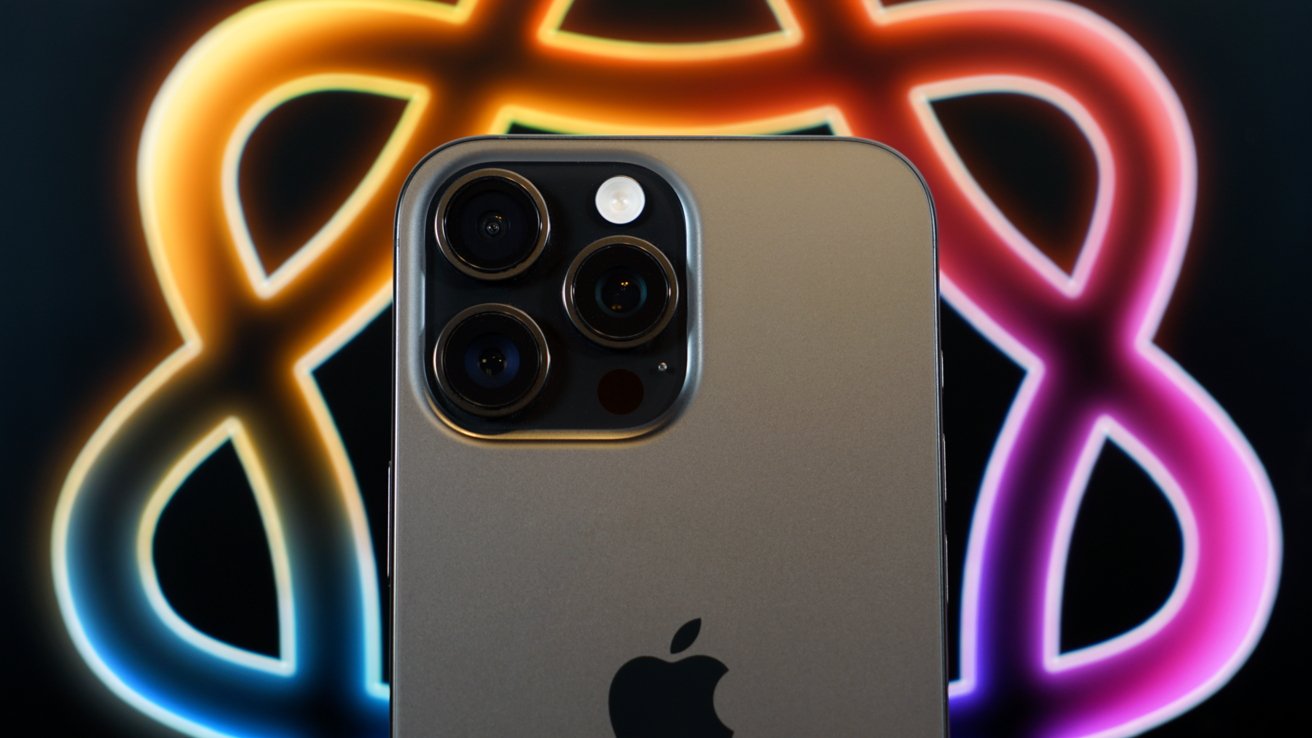Apple's AI team grew fast but it probably won't shrink as quickly
Apple's foundational models team is key to the company's artificial intelligence efforts, but while the rapidly-formed group has endured managerial turmoil, it's not necessarily going to lose all of its main members.

The type of question Apple promises Siri will be able to answer with Apple Intelligence. Eventually. - Image source: Apple
The foundational models team is a group dedicated to creating the large language models (LLMs) and other elements that drive functions in Apple Intelligence. With AI being a major component of the modern-day tech landscape, it is quickly becoming an essential part of Apple's development process.
However, with managerial stumbles and the poaching of major members from the team, such as Ruoming Pang by Meta for about $200 million, there is the fear that there could be a "brain drain" of the team in progress. With massive temptations and executive blunders, according to The Information on Tuesday, one seems inevitable.
That all depends on whether the group is made up of employees easily swayed by the temptation, and are willing to step out of the relatively cushy confines of Cupertino.
Fast growth when it was needed
The Apple foundational models team consists of a few dozen individuals, including researchers within the artificial intelligence field. That group has been built up over a couple of years, and in the face of necessity.
This was especially the case in the years following the introduction of Siri, with Ai development being a constant struggle.
This has included the hiring of John Giannandrea from Google in 2018, to try and rejuvenate and focus more on AI research. However, Giannandrea became more interested in Siri than in the AI push as a whole.
Subsequently, Apple started to allow researchers to publish papers more frequently, departing from the ingrained culture of secrecy.
In 2021, Pang was recruited from Google DeepMind to work on creating foundational models for Apple. This was a sudden injection of knowledge to the team, with Pang's background in developing and training large AI systems helping efforts.
Pang was important enough to the effort that Apple allowed him to work from New York instead of moving to Cupertino. At the time, the group was small, but Pang started to recruit from other tech companies to fill out the numbers.
Following the introduction of ChatGPT in 2022, Giannandrea's team seemingly didn't respond with any real urgency. Pang, meanwhile, had been building LLMs, though Giannandrea apparently held them back.
One year later, Apple formally established Pang as the lead of the foundational models group, and by 2024, it had grown to 40 researchers in total. However, even with the launch of Apple Intelligence that year, the team didn't feel there was clear direction on the technology from upper management.

John Giannandrea
Team members were still happy with progress on the models, and by early 2025, they thought an LLM to power an all-new Siri was possible by April 2025. Despite building a conversational and task-completing version of Siri, it wasn't enough to impress Giannandrea and the Siri team.
Initially silent, Giannandrea was enthusiastic by the end of the meeting, calling it the "future of the company," according to a report source. However, by March, Apple said that the new Siri was being delayed to 2026.
It turns out that Pang's team wasn't consulted about the delay or were told what was wrong at all.
Eventually, the Siri team was taken away from Giannandrea's control in favor of Mike Rockwell and Craig Federighi. However, the foundational models team were still reporting o Giannandrea.
Though Pang and the team were informed that the shuffle was due to Siri and not the AI models, the reassurances was undermined by the Siri team. Instead of using Apple's in-house models made by Pang's group, the Siri team were allegedly considering using third-party models.
If true, it was a galling play and an afront to the foundational models team, which had made considerable progress. Undermining the team demoralized the group, and reportedly prompted some to consider departing.
An alleged brain drain
While the decision of Pang and others to leave Apple for greener pastures may have been driven both by being underappreciated and massive financial temptations, it may not be a complete mess when it comes to retainment.

Apple Intelligence is increasingly important to iPhone
Apple, like other tech companies, offer hefty pay packages and other benefits that can often keep an engineer around for longer. For someone in the AI field, this can include being able to work on the newest high-performance hardware, and being given more free reign to do whatever they want.
There is also an element of the "squeaky wheel gets the grease" in play here. Those who are speaking to outside publications may have an axe to grind, and can therefore become the most vocal contingent.
It's plausible that a few employees in the team who are unhappy have spoken out about the events, but the rest could be content enough to stay put. There may be enough compensation and perks on hand to keep the average member at ease.
Also, remember that Apple is a company with considerable resources at its disposal. It may not wish to go down the route of Meta and offer hundreds of millions of dollars worth of incentives to one future employee, but it has the capability to do just that if needed.
It may not have been easily able to hand $200 million to all of its AI engineers, but Apple can certainly make them comfortable enough to stay put. And while the promise of work on superintelligence may be appealing to some, others may want to stick to the more grounded AI work Apple is focused on.
Read on AppleInsider

Comments
When there's a hot job market (like AI) it's easy for an employer to wave money and benefits at potential hires. These companies are all competing for the same limited pool of candidates. Ultimately people of this caliber are going to go where they can go to work on projects that they find interesting. Sure, the money is important but it's not the only thing. Getting paid a lot and being miserable in your position is not tolerable for very long when there are so many alternatives available in landscape that's moving at light speed.
The pictured John Giannandrea was formerly with Google before he joined Apple. Many of these people jump ship. In fact, it's a pretty well accepted understanding that an easy to advance your career is to go somewhere else. After all that's really how Silicon Valley came to be. Note that some people aren't joining the big players, they are going to startups, often in stealth mode. For fast moving technology like AI, a small, more nimble organization can make more adjustments, change course more rapidly than Fortune 50 company.
Apple -- like all high-tech companies -- has used "golden handcuffs" for decades (currently RSUs, previously stock option grants) to retain employees. But in the current AI employment market, leaving behind a bunch of unvested RSUs might be acceptable if there's the promise of more RSUs elsewhere at a place that is offering more interesting work (a reason to get up in the morning).
All of these companies are challenged to make these positions and assignments interesting for this highly prized talent. At some point, something else will step into the limelight and AI industry employment will normalize but right now, it's a true battle for top level talent.
Let's be clear that no one is profitably running a consumer AI business right now. It's also important to note that IRS regulation changes a few years ago have prompted many companies (not just high tech) to let go of some employees involved in R&D. So there are other forces in play beyond just paying someone a buck more than the competition.
The fact that Apple grew its AI group very rapidly shows how much they realized that they were caught off guard. Apple's hiring pace is typically extremely slow and deliberate compared to the competition. Note that they had basically no mass layoffs like others a few years ago because they did not hire like crazy.
It's sad that Meta is doing it, their whole business model is evil.